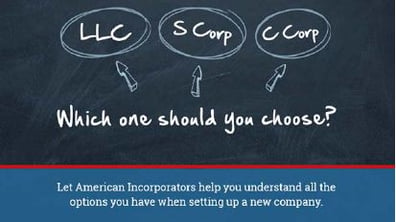What's the Right Choice For My Business?

The primary entity types available in the United States are Corporations, Limited Liability Companies and Non-Profits. Corporations issue shares of stock to owners and are run by officers and directors. Limited Liability Companies (LLCs) are owned by members and can be run by the members or appointed managers. Non-profit organizations offer similar limited liability protections to corporations and LLCs, but have the added benefit of tax free existence as defined under section 501(c)(3) of the IRS Code. How do you know which entity type to choose? A lot of factors go into deciding which entity type is best for you. These include legal liability, tax implications, costs and future needs. This is an important decision and should be done after consulting a trusted accountant or attorney.
Comparing Entity Types:
| C Corporations | S Corporations | LLCs | Non-Profits | |
| Liability of Owners |
Limited, even if shareholders participate in management |
Limited, even if shareholders participate in management | Limited, even if shareholders participate in management | Unlimited |
| Number of Owners | No maximum | Maximum 100 (as of 2005) | No maximum, minimum of at least 2 | One |
| Profit/Loss & Distributions | Special allocations permitted separate classes of stock | No special allocations permitted | Special allocations permitted | N/A |
| Transferability of Interests | No restrictions | No restrictions, but must be eligible shareholder of "S" status terminates | Restricted, typically requires approval of majority of members | N/A |
| Federal Income Tax | Maximum 35% on Corporation, plus tax on dividends to shareholders | No corporate tax unless previously a C corporation | None at LLC level | Taxed on individual return |
Find the answers to all of your major incorporation questions in our new eBook

 Call:
Call:  Live Chat
Live Chat







